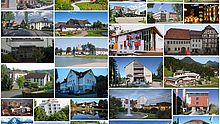It will be necessary to exploit the entire range of energy-saving potential in order to meet the Federal Government’s ambitious target of achieving a largely climate-neutral building portfolio by 2050. The owners and managers of larger building and real estate portfolios in the states and municipalities are facing stern challenges. This applies also to the housing industry. An important factor is that the energy-efficient refurbishment plans must be implemented cost effectively, to suit requirements and in a socially acceptable manner.
dena offers its expertise and advice to public sector housing companies and real estate managers. The development of long-term refurbishment strategies is advisable, especially for large real estate portfolios that sometimes comprise several thousand properties.
The refurbishment roadmap points the way.
So-called Refurbishment Roadmaps (RRM) can be used to analyse entire building portfolios. The refurbishment requirements of each building are identified based on defined criteria such as energy savings and investment costs. The RRM indicates in detail which buildings should be prioritised for modernisation for reasons of cost effectiveness, and which ones already satisfy a comparatively high standard. This gives owners and managers a clear overview of how and in which period they can purposefully refurbish their portfolio, how much it will cost, and how much they can save.
Services for contracting and municipalities
Anyone looking to use external service providers to improve the energy efficiency of their building will find competent advice at the Centre of Expertise for Building Contracting. In addition, dena's energy and climate protection management for municipalities helps public administrations to develop their focuses and strategies to increase energy efficiency in buildings.
A focus on industries and districts
dena recently launched an industry-specific pilot project that is designed to advance the energy-efficient refurbishment of hotels and accommodation facilities. Moreover, it will become increasingly important to expand the scope of thinking beyond individual buildings to encompass the energy-efficient development of quarters, districts and even entire cities. dena has its eye on these goals as well.



